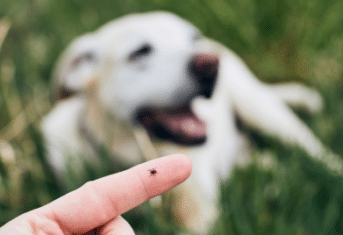Toe Tumors in a Dog: A Cancer Survivor's Story
Toe Tumors in a Dog: A Cancer Survivor's Story
 This photo shows something unique. Look carefully and you will see a dog with three toes on each foot. No, he wasn’t born this way, Pogo is a cancer survivor. The missing toes were amputated because of a cancer diagnosis in a toe on each of his front feet.
This photo shows something unique. Look carefully and you will see a dog with three toes on each foot. No, he wasn’t born this way, Pogo is a cancer survivor. The missing toes were amputated because of a cancer diagnosis in a toe on each of his front feet.
How common are toe tumors?
Research has shown just over half of toe masses are malignant tumors. The most common malignancy of canine toes is squamous cell carcinoma, and the dog pictured here lost his first toe when surgeons cured him of this tumor. Three years after the diagnosis of squamous cell carcinoma, Pogo’s family, ever vigilant since the first cancer diagnosis, noticed a mass on one of his paw pads. Given his prior cancer diagnosis and knowing some dogs have multiple toes affected with squamous cell carcinoma, Pogo returned to AMC to have the second toe removed. Surprisingly, the diagnosis was melanoma, which is the second most common toe tumor.
What dogs get toe tumors?
Any dog can develop a tumor of the toe, but large breed, black coated dogs such as standard poodles, Rottweilers, Labrador retrievers and giant schnauzers have an increased risk of developing squamous cell carcinoma of the toe. Melanoma too, has been reported more often in black coated dogs, and in one study, the Scottish terrier was predisposed to melanoma.
How would I recognize a toe tumor?
An observant dog owner may notice their dog licking one particular toe, suggesting the toe hurts and cluing them in to a potential problem requiring medical attention. The presence of a mass on the toe suggests a toe tumor, but other possibilities include an infection, inflammation from a foreign object lodged in the toe, or a benign tumor. A broken or bleeding toenail may be another sign indicating the presence of a toe tumor. Should you see any of these abnormalities on your dog’s toes, head to your veterinarian’s office immediately.
If your dog develops a toe tumor, don’t despair; early detection and prompt surgical intervention can make your dog a cancer survivor too.































